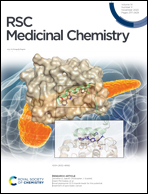ValCitGlyPro-dexamethasone antibody conjugates selectively suppress the activation of human monocytes†
Abstract
Glucocorticoids (GCs) are effective in treating autoimmune and inflammatory disorders but come with significant side effects, many of which are mediated by non-immunological cells. Therefore, there is rapidly growing interest in using antibody drug conjugate (ADC) technology to deliver GCs specifically to immune cells, thereby minimizing off-target side effects. Herein, we report the study of anti-CD11a, anti-CD38, and anti-TNFα ADCs to deliver dexamethasone to monocytes. We found that anti-CD11a and anti-CD38 were rapidly internalized by monocytes, while uptake of anti-TNFα depended on pre-activation with LPS. Using these antibodies were attached to a novel linker system, ValCitGlyPro-Dex (VCGP-Dex), that efficiently released dexamethasone upon lysosomal catabolism. This linker relies on lysosomal cathepsins to cleave after the ValCit sequence, thereby releasing a GlyPro-Dex species that undergoes rapid self-immolation to form dexamethasone. The resulting monocyte-targeting ADCs bearing this linker payload effectively suppressed LPS-induced NFκB activation and cytokine release in both a monocytic cell line (THP1) and in human PBMCs. Anti-TNFα_VCGP-Dex and anti-CD38_VCGP-Dex were particularly effective, suppressing ∼60–80% of LPS-induced IL-6 release from PBMCs at 3–10 μg mL−1 concentrations. In contrast, the corresponding isotype control ADC (anti-RSV) and the corresponding naked antibodies (anti-CD38 and anti-TNFα) resulted in only modest suppression (0–30%) of LPS-induced IL-6. Taken together, these results provide further evidence of the ability of glucocorticoid-ADCs to selectively suppress immune responses, and highlight the potential of two targets (CD38 and TNFα) for the development of novel immune-suppressing ADCs.



 Please wait while we load your content...
Please wait while we load your content...